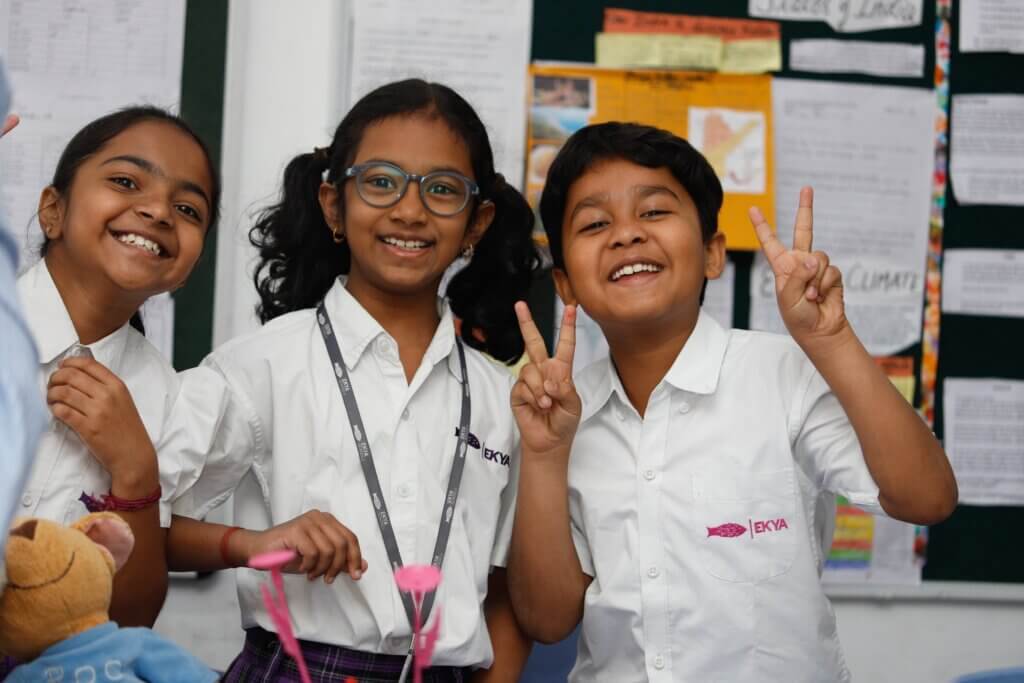Performing Arts Program
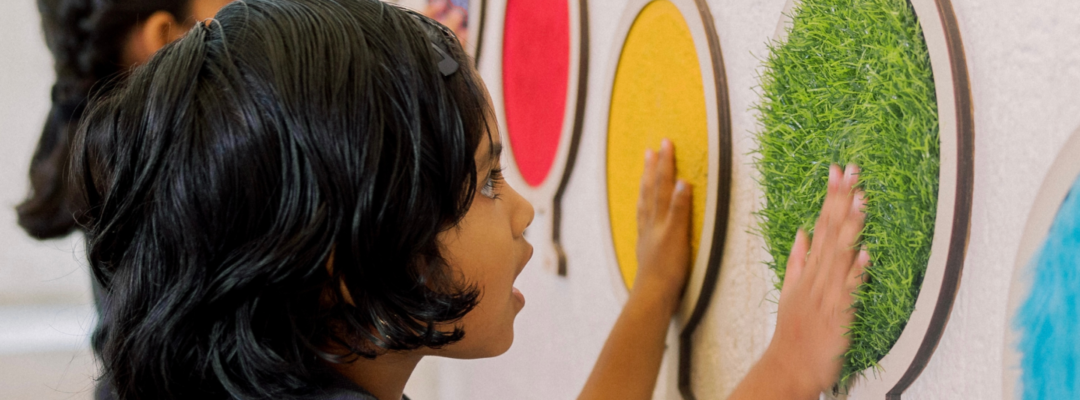
Learning Area Purpose
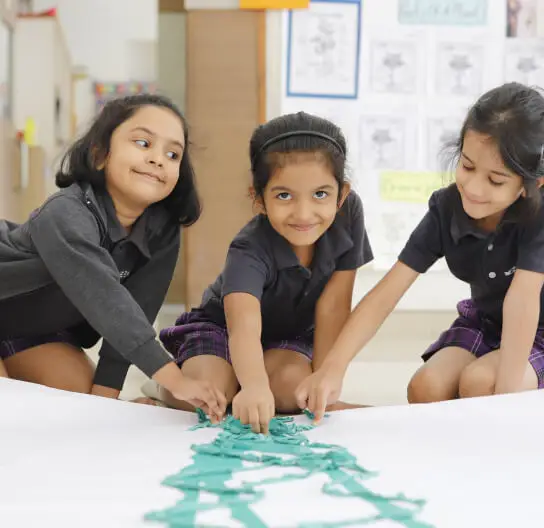
The Performing Arts program at Ekya Schools offers an enriching and inspiring experience that empowers students to discover and develop their talents and interests and to express themselves with confidence and creativity. This program is offered to students from Early Years to Grade 8.

The Performing Arts Program equips learners to:
- Express themselves in a creative manner, communicating through art forms such as dance, music and visual arts.
- Explore a variety of cultures and appreciate the various forms of artistic expressions of people around the world.
- Make connections between the arts and other disciplines.
The Performing Arts program at Ekya Schools offers a comprehensive curriculum, which empowers students to develop their creative and expressive abilities. The program is designed to provide students with skills in the disciplines of music, dance, and theatre, with a strong emphasis on fostering self-expression, creativity, and personal growth.
Dance
Students will develop knowledge, understanding, and skills to communicate using the elements of dance, including space, time, dynamics, and relationships, learning to work with the body as the medium of dance and use dance composition processes to explore, organise, and refine movement for choreography and performance.
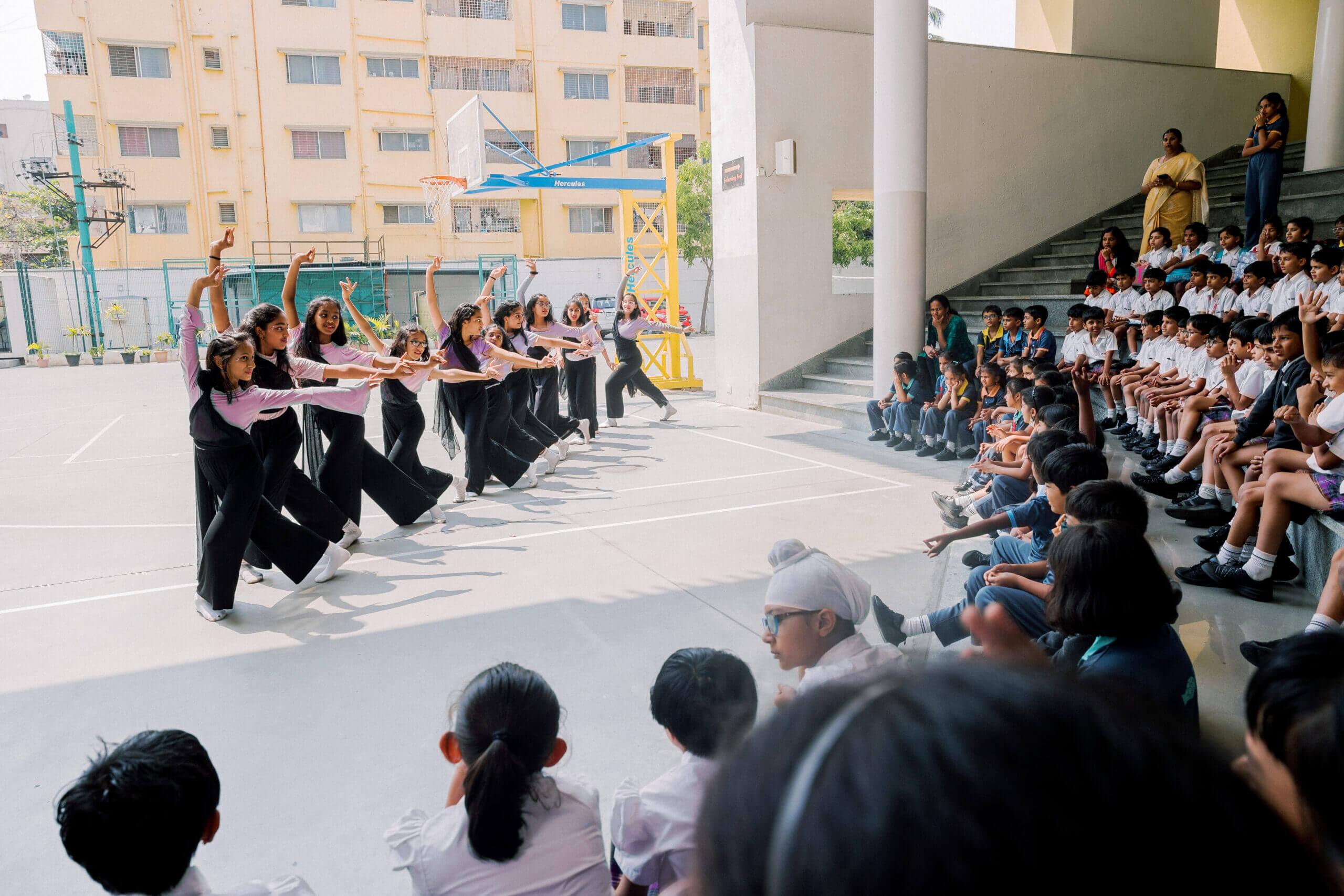
- Performance Skills: Our students develop performance skills and techniques to express themselves creatively.
- Dance Exploration: Our students explore and develop their dance skills and techniques.
- Dance Composition: Our students learn to apply dance composition processes to refine movement for choreography and performance.

Dance
Students will develop knowledge, understanding, and skills to communicate using the elements of dance, including space, time, dynamics, and relationships, learning to work with the body as the medium of dance and use dance composition processes to explore, organise, and refine movement for choreography and performance.
Dance Exploration: Our students explore and develop their dance skills and techniques.
Dance Composition: Our students learn to apply dance composition processes to refine movement for choreography and performance.
Performance Skills: Our students develop performance skills and techniques to express themselves creatively.
Theatre/Drama
Students will explore, depict, and celebrate human experience by imagining and representing people through live enactment.
They will see drama as a collaborative art, combining physical, verbal, visual, and aural dimensions and experience theatre by developing an understanding of the performer/audience relationship.
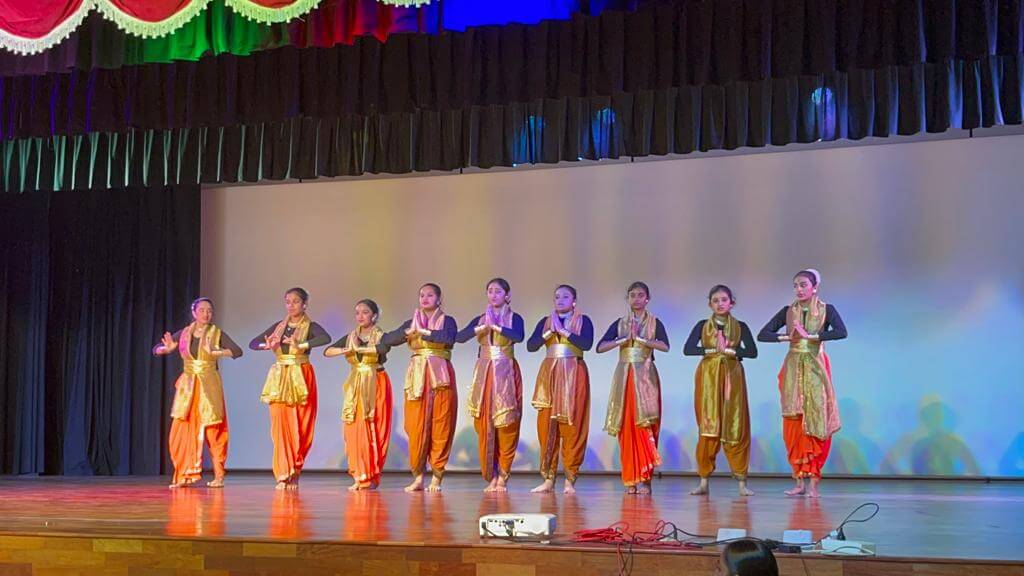
• Emphasis is placed on collaborative projects that build teamwork and interpersonal skills.
• Effective communication is cultivated through engaging presentations and discussions.
• Problem-solving is integrated across subjects to strengthen critical thinking abilities.
• Computational thinking principles are applied in practical, real-world contexts.
• Technology is used to create immersive and interactive learning experiences.
Theatre/Drama

Students will explore, depict, and celebrate human experience by imagining and representing people through live enactment. They will see drama as a collaborative art, combining physical, verbal, visual, and aural dimensions and experience theatre by developing an understanding of the performer/audience relationship.
• Emphasis is placed on collaborative projects that build teamwork and interpersonal skills.
• Effective communication is cultivated through engaging presentations and discussions.
• Problem-solving is integrated across subjects to strengthen critical thinking abilities.
• Computational thinking principles are applied in practical, real-world contexts.
• Technology is used to create immersive and interactive learning experiences.
Music
Students will use the concepts and materials of music to compose, improvise, arrange, perform, conduct, and respond to their own and others’ work. They will learn the elements of music, including duration (rhythm and tempo), dynamics, form, pitch (melody and harmony), and timbre, the sound texture and quality), and be able to apply this knowledge to the voice, body, instruments, found sound sources, and information and communication technology.
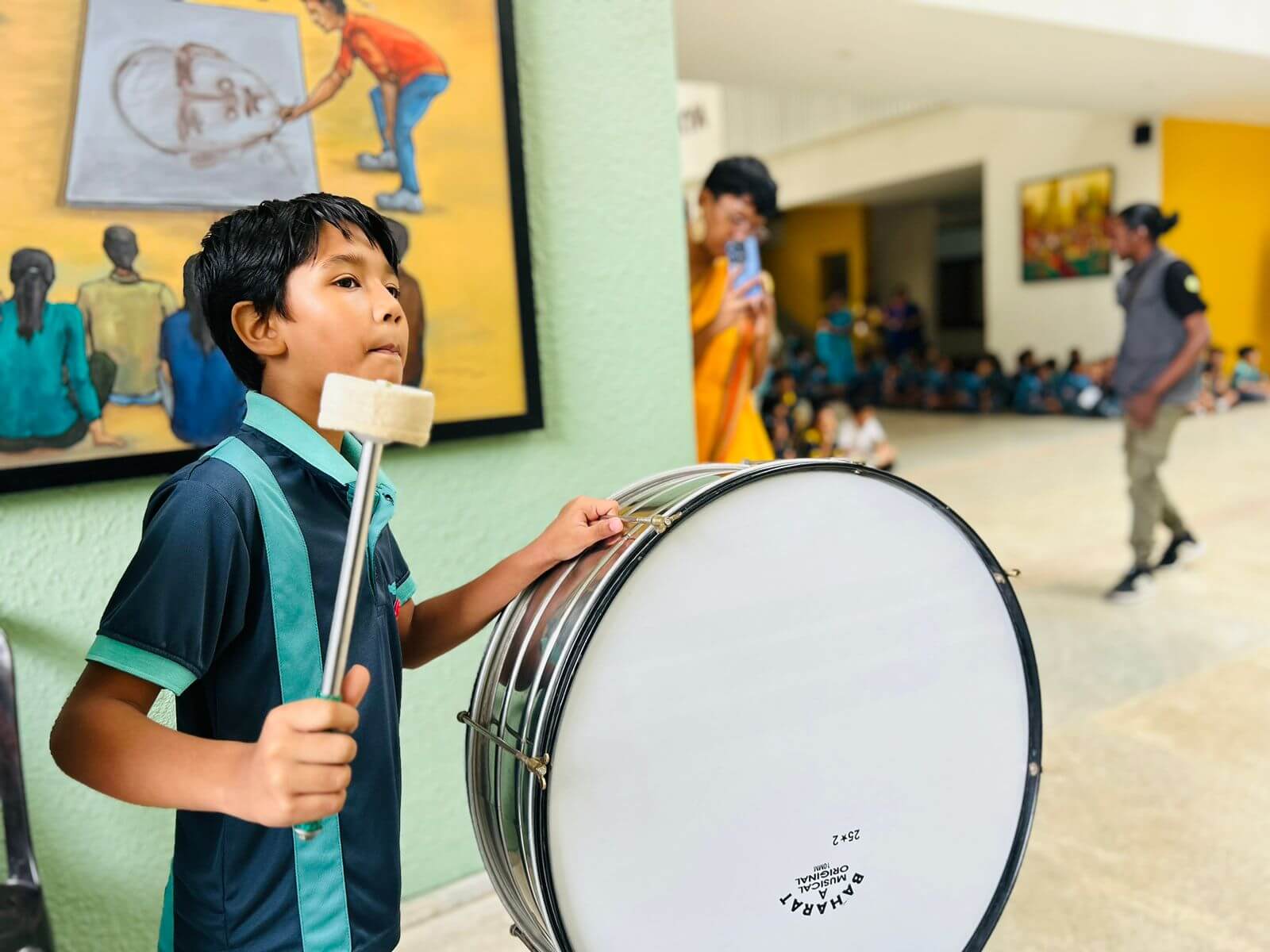
- Performance Skills: Through performance, students develop skills and techniques to express themselves creatively.
- Music Expression: By composing, improvising, and performing music, students express themselves creatively.
- Music Elements: Students learn to apply music elements, including duration, dynamics, form, pitch, and timbre, to performance.

Music
Students will use the concepts and materials of music to compose, improvise, arrange, perform, conduct, and respond to their own and others’ work. They will learn the elements of music, including duration (rhythm and tempo), dynamics, form, pitch (melody and harmony), and timbre (sound texture and quality), and be able to apply this knowledge to the voice, body, instruments, found sound sources, and information and communication technology.
Music Expression: By composing, improvising, and performing music, students express themselves creatively.
Music Elements: Students learn to apply music elements, including duration, dynamics, form, pitch, and timbre, to performance.
Performance Skills: Through performance, students develop skills and techniques to express themselves creatively.
Languages Offered
| Category | Languages | Grades |
|---|---|---|
| First Language | English | Grades 1-12 |
| Second Languages | Kannada, Hindi, French | Grades 1-10 (French from Grades 5 & 6) |
| Third Languages | Kannada, Hindi, French | Grades 5-8 |
Learning Area Purpose
The Language program equips learners to:
- Make meaning of the language
- Understand a variety of texts and develop an informed appreciation for literature
- Communicate effectively and creatively, according to the medium and the audience
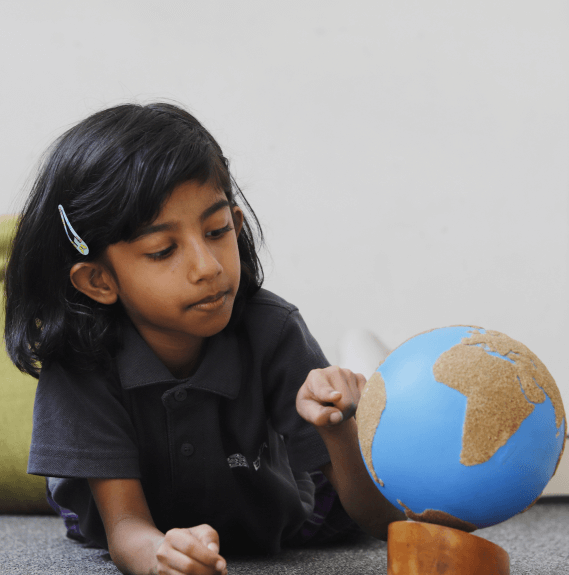
Key Learning Experiences
Love to Read Program
Ekya’s ‘Love to Read Program’ encourages students to explore new genres, authors, and stories, developing essential skills and fostering a lifelong love for reading. The program includes experiences such as –

- Author Talks: Our students engage with and draw inspiration from popular Authors
- Guided Levelled Reading Program: Implement a program to support all readers and their diverse reading abilities.
- Literary Circle: Foster literary engagement through the School’s Literary Circle.
- School Book Club: Participate in the School Book Club.
- Reading Initiatives: Introduce initiatives like Drop Everything And Read (DEAR) time, Reading Week, and Read-aloud events to promote reading.
- Ekya Publications: Curate and showcase student work through Ekya Publications.
- Creating Literature: Create literature to empower students to become confident writers.
Immersion into Fiction, Nonfiction, and Poetry
Ekya, through our language program, students will delve into diverse genres of books. Each student is distinct, so we encourage them to explore various genres and discover their ideal fit.

- Inclusion of Indian Authors: Award-winning Indian authors’ works are featured in contemporary Indian settings.
- Building Empathy: Diverse book titles help build empathy and understanding among students.
- Overview of the Book Plan: A plan designed based on international benchmarks and standards prepares students for various language uses.
- Grade-Specific reference books: Grade-specific books, such as ‘Sunita Williams- A Star in Space’ by Aravinda Anantharaman for Grade 5, are provided.
- Books About Books: Early grades start the year with stories that celebrate books and libraries, fostering a love for reading from a young age.
- Summer Reading Program- A structured summer reading program encourages children to read during school breaks.
Writing Process
The writing process is a significant part of the language program where all writing is treated as a creative act which requires time and positive feedback. Students use feedback to modify their work and have to return to the prewriting step to develop and expand their ideas.
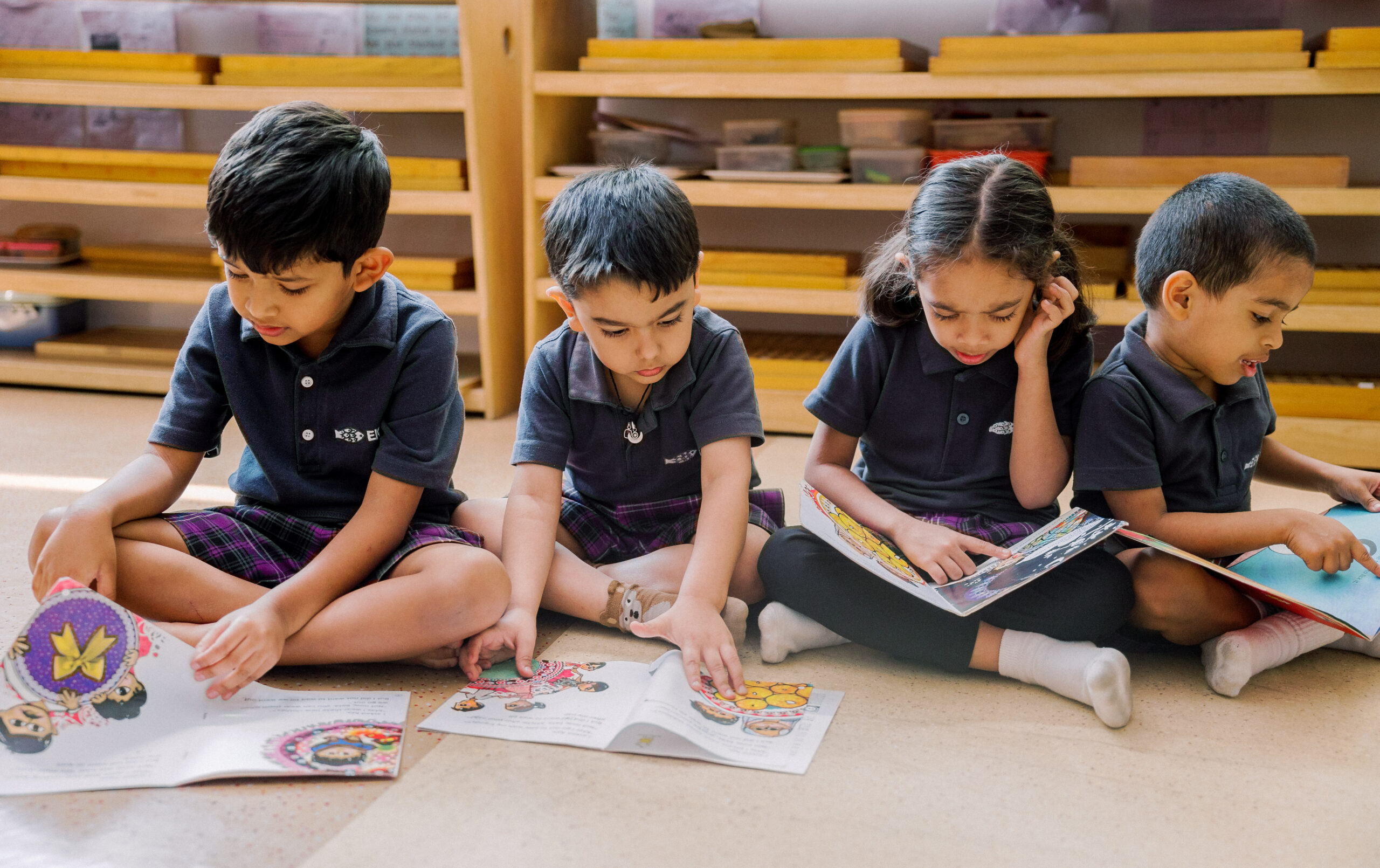
- Prewrite: Students generate ideas, choose a topic, and outline their approach.
- Research: Sources are identified, information is gathered, and findings are categorised.
- Draft: The next step is to write freely, review their work, and revise until satisfied.
- Revise: Then, paragraphs are reorganised, unclear language is replaced, and content is refined.
- Edit & Proofread: The final step involves reviewing formatting, grammar, and punctuation to ensure a polished product.
Language Tools
Ekya’s language program employs interactive techniques like Reader’s Theater and Author’s Chair to enhance literacy skills, foster creativity, and build community, making student thinking visible and deepening comprehension through peer collaboration.

- Reader’s Theater: Perform scripts to enhance reading fluency and comprehension.
- Reading Jigsaws: Read, summarise, and share sections of a text to piece together the full story.
- Author’s Chair: Share writing and receive feedback to build a supportive writing environment.
Performing Arts


The Performing Arts program at Ekya Schools offers a comprehensive curriculum, which empowers students to develop their creative and expressive abilities. The program is designed to provide students with skills in the disciplines of music, dance, and theatre, with a strong emphasis on fostering self-expression, creativity, and personal growth.

Learning Area Purpose
The Performing Arts program at Ekya Schools offers an enriching and inspiring experience that empowers students to discover and develop their talents and interests, and to express themselves with confidence and creativity. This program is offered to students from Early Years to Grade 8.
The Performing Arts Program equips learners to:
- Express themselves in a creative manner, communicating through art forms such as dance, music and Visual arts.
- Explore a variety of cultures and appreciate the various forms of artistic expressions of people around the world.
- Make connections between the arts and other disciplines.
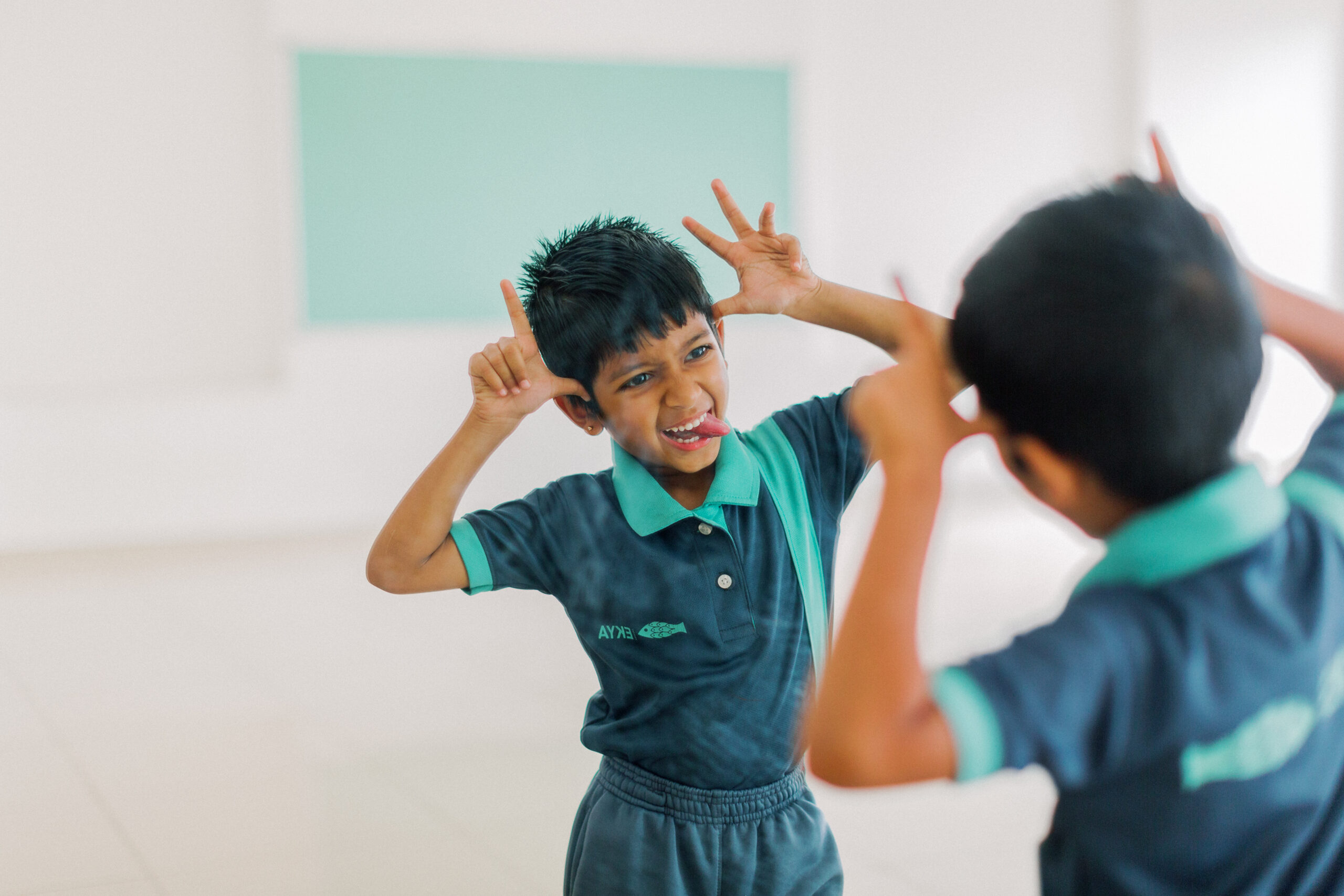
Key Learning Experiences
Dance
Students will develop knowledge, understanding, and skills to communicate using the elements of dance, including space, time, dynamics, and relationships, learning to work with the body as the medium of dance and use dance composition processes to explore, organise, and refine movement for choreography and performance.

- Dance Exploration: Our students explore and develop their dance skills and techniques.
- Dance Composition: Our students learn to apply dance composition processes to refine movement for choreography and performance.
- Performance Skills: Our students develop performance skills and techniques to express themselves creatively.
Theatre/Drama
Students will explore, depict, and celebrate human experience by imagining and representing people through live enactment. They will see drama as a collaborative art, combining physical, verbal, visual, and aural dimensions and experience theatre by developing an understanding of the performer/audience relationship.

Emphasis is placed on collaborative projects that build teamwork and interpersonal skills.
Effective communication is cultivated through engaging presentations and discussions.
Problem-solving is integrated across subjects to strengthen critical thinking abilities.
Computational thinking principles are applied in practical, real-world contexts.
Technology is used to create immersive and interactive learning experiences.
Music
Students will use the concepts and materials of music to compose, improvise, arrange, perform, conduct, and respond to their own and others’ work. They will learn the elements of music, including duration (rhythm and tempo), dynamics, form, pitch (melody and harmony), and timbre (sound texture and quality), and be able to apply this knowledge to the voice, body, instruments, found sound sources, and information and communication technology.

- Music Expression: By composing, improvising, and performing music, students express themselves creatively.
- Music Elements: Students learn to apply music elements, including duration, dynamics, form, pitch, and timbre, to performance.
- Performance Skills: Through performance, students develop skills and techniques to express themselves creatively.

